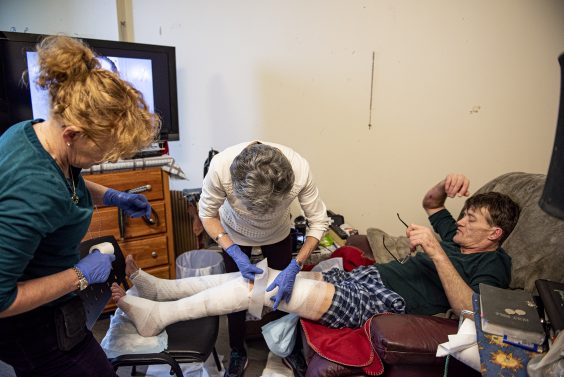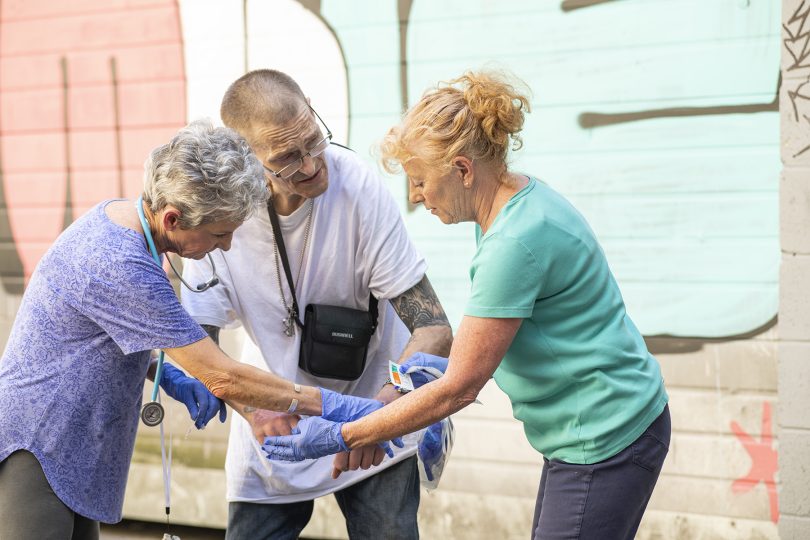Home-care nurses Evanna Brennan and Susan Giles, who have worked closely with the BC Centre for Excellence in HIV/AIDS and St. Paul’s Hospital, have been named to the Order of British Columbia.
The honour marks their long careers providing life-saving care to people living with HIV/AIDS and significant health issues in Vancouver’s Downtown Eastside (DTES).
The Order, BC’s highest recognition, honours those who have served their communities with distinction and have excelled in their fields.
Previous Providence-affiliated appointees include Dr. Julio Montaner and Dr. Bruce McManus.
“We’re completely blown away by the whole event. We’re just completely blown away,” says Brennan, 76.
Giles and Brennan saw the beginning of the HIV epidemic and witnessed the drug and overdose crisis develop into what it is today. Throughout it all, they have remained stalwart pillars care and compassion for Vancouver’s most vulnerable population.
The DTES, a neighborhood with disproportionally high levels of drug use, homelessness, poverty, crime, and mental illness, became their area of primary patient care and most urgent need. Complex health care problems began to ramp up in earnest in the 80s with an influx of hard drugs and the start of the HIV epidemic.
“Lucky or unlucky, we just happened to be there at the beginning,” says Brennan.
Adapting home-care nursing
Giles, who is 70, and Brennan recognized that typical home-care nursing methods did not fit this patient population, so they adapted the process to work in these circumstances. Their patients would not go to clinics, so they would track them down and bring care to them. Sometimes that meant asking someone’s drug dealer where to find them, or dressing a wound in a bar.
Before there were effective HIV treatments, they mostly provided palliative care, but palliative care looks different for someone who uses drugs. They learned how to provide care in that situation together with an outreach doctor, Susan Burgess, whom they continued to work with over the years. They also received support from the BC Centre for Excellence in HIV/AIDS at St. Paul’s Hospital and the Canadian Association of Nurses in AIDS Care.
An innovative model for nursing – Action Based Care
Giles and Brennan used their experience to develop an innovative model for nursing called Action Based Care. It is a holistic, relationship-based approach to medicine that incorporates harm-reduction principles. It is designed create access to care and meet patients where they are. A core part of their care is respecting the patient’s autonomy and space.
“It’s that respect. The same way that you would want respect if a health person came into your home,” says Brennan. “That’s hard to do, when you know you can help them, or make life much easier for them. But it’s not what we’re asked to do by them.”
Action Based Care also involves putting aside any judgements or prejudices to focus on building care around what works best for the patient.
“It’s not easy to like people who use self-destructive things,” says Giles. “But you have to kind of accept that, or you’re always going to be in conflict over what you’re doing.”
They go above and beyond typical home-care nursing, including buying food and other supplies out of their own pockets. Filling those needs helps build the trust needed to get the nurses through the door, and the relationships that are a core facet of Action Based Care.
Giles and Brennan have fond memories of one of their patients, a woman with HIV who was 22 when she passed.
“She was easy to love. She really was easy to love,” says Brennan. In the end, she could not really eat, but she loved slurpies the nurses would bring to her. “I’m so glad we did that.”
Persevering through the years
The two retired from their positions with Vancouver Coastal Health in 2012, but continue to provide care as independent contractors. The DTES is an unsafe area, but its residents are protective of Brennan and Giles. They stick out as nurses, and their patients – and their patient’s drug dealers – know who they are.
Their close partnership has been key to them being able to continue this work for so long. They originally went out as a pair for safety, but quickly realized the benefits of being able to combine their expertise to provided augmented patient care and support each other through chaotic situations.

Their compassion has also driven them to continue.
“If you’ve seen someone die of AIDS, you will do anything to get that person to be able to take the meds, to stop looking like a skeleton and being so sick,” says Giles. “And we had seen that, so it really spurred us on.”
The problems in the DTES have only grown more severe over the years. In one building they work in, nine people overdosed within two months. Giles and Brennan used to go to every funeral. Today, they can’t keep up.
“I didn’t think it could get worse, but it is worse. The drugs are worse, the homelessness is worse, the street scene is more violent,” says Giles.
“And the overdoses are shocking,” says Brennan.
Contributing to nursing education
Giles and Brennan have shared the knowledge they have gained over the years and have taught nursing students from Canada, the US, Europe and Asia. They have presented at national and international conferences, too.
“I hate the phrase ‘make a difference,’ but it actually did make a difference for some of those people who were terrified of the Downtown East Side,” says Brennan. “They had never been there before, they saw the people as far too different, and they didn’t know how to approach them. Then they saw how we were doing it.”
“A lot of them reflected afterward in their journals that it made them less afraid to talk to people. They’re people, just like everyone else,” says Giles.
They want to continue to mentor other nurses and help influence the next generation. They hope that the documentary that covered them and their work, Angels on Call (2020), could be used as an educational tool and help spread the philosophy of Action Based Care.
Honoured by appointment
When Giles and Brennan received a phone call informing them that they were being appointed to the Order of British Columbia, they were completely surprised – they had no idea that they were nominated.
“I started to cry,” says Brennan. “I just couldn’t believe it. I was just emotionally, and in every other way, shocked. Thrilled to bits, as well.”
Giles was in disbelief, even suspecting that it might be a spam call. “I think I interrupted her and said, is this for real? This doesn’t sound real. And she went, ‘Oh it’s real, it’s real.’”
They are honoured to be in the company of those who have previously been appointed to the Order, and are grateful to those involved in their nomination.
Giles and Brennan have saved uncounted lives over the years by providing lifesaving medication and wound treatment to those who otherwise would have fallen through the cracks of the medical system.





